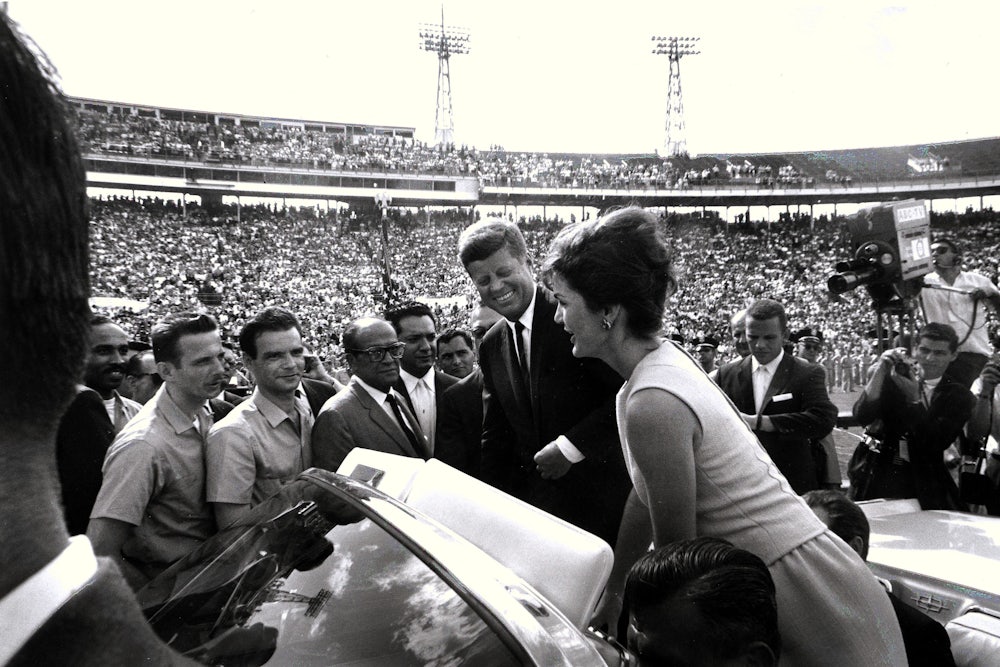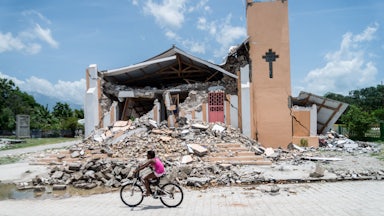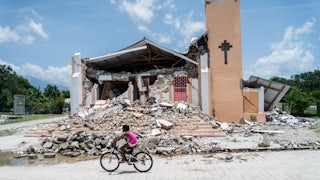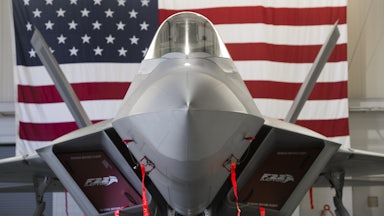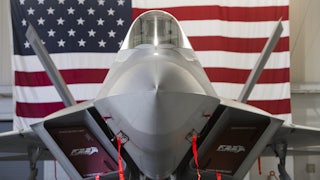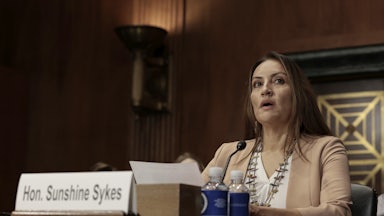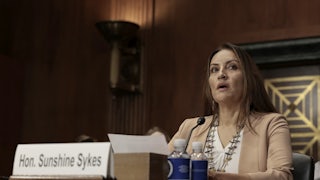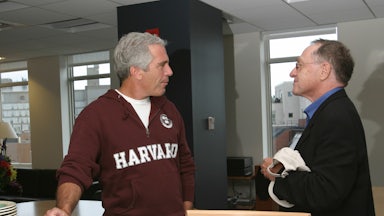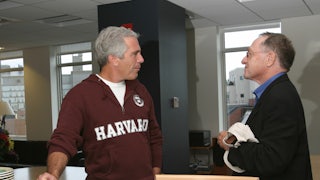The early media assessments of Joe Biden’s Afghanistan withdrawal were as consistent as they were overheated: It was a “catastrophe,” a “disaster,” a “fiasco,” a “debacle,” a “calamity.” Not for six long decades has an overseas action by an American president generated a similar across-the-board reaction; in that case, it was the Bay of Pigs invasion of Cuba in April 1961, authorized by John F. Kennedy soon after he took office. Carried out by U.S.-trained Cuban émigrés and aimed at overthrowing Fidel Castro’s two-year-old government, the operation bogged down immediately and never recovered. “The Perfect Failure,” Trumbull Higgins titled his book-length examination of the invasion, and he was not far off.
“How could I have been so far off base?” Kennedy asked himself as the outcome of the operation became humiliatingly clear. “All my life I’ve known better than to depend on the experts. How could I have been so stupid, to let them go ahead?” Kennedy determined to improve from the experience, and to do things in a different way. In core respects—though not all—he did. His public standing actually improved in the aftermath of the invasion, in no small part because he took responsibility and admitted error. There are lessons here for Biden, should he choose to take them.
The Cuba plan originated under Kennedy’s predecessor, Dwight D. Eisenhower. Since seizing power in 1959, Castro had moved steadily to break the U.S. grip on Cuban trade and, after some hesitation, signed a trade agreement with the Soviet Union. Eisenhower ordered the CIA to devise plans to overthrow the Castro government, and the agency also plotted an assassination of the Cuban leader. Castro in turn drew closer to Moscow.
Undergirding the subsequent CIA plan was the conviction that Castro and his government commanded little popular backing. It followed that a small amphibious invasion, carried out by U.S.-trained and equipped Cuban exiles, would likely trigger a widespread revolt that would overthrow Castro and restore a government friendly to American interests. JFK had doubts that the scheme would work (unbeknownst to him at the time, so did many within the CIA), but he signed off, with the proviso that the United States not become directly involved.
In the early hours of April 17, 1961, the invading force of close to 1,500 landed at the swampy Bahia de Cochinos, but its appearance failed to trigger widespread rebellion, despite the work of CIA agents in Havana and other Cuban towns. Ammunition vessels failed to reach the beaches. As the attackers came up against Castro’s military, Kennedy, still trying vainly to keep U.S. involvement in the operation hidden, refused to sanction air cover for the invaders, who were swiftly overwhelmed and captured, then paraded before the television cameras for the world to see. Castro emerged stronger, supported by Cuban outrage at the U.S.-orchestrated attack, and he soon concluded a mutual defense treaty with the Soviet Union.
Which raises the question of why Kennedy went ahead. He had personal doubts, after all, and although almost all his senior civilian and military advisers backed the invasion plan, several figures whose opinions he valued did not—Senator J. William Fulbright, diplomat Thomas Mann, and historian and White House aide Arthur M. Schlesinger Jr. among them. The staunch advocacy of the CIA and the Joint Chiefs of Staff certainly pushed him forward, as did the momentum that had been built up over many months of planning and preparation. (Kennedy told a British journalist soon afterward that he could not have called a halt to the operation without a “screaming of gears” within the government.) Kennedy’s own desire to see Castro ousted also factored in, as did his campaign rhetoric from the previous year—he had vowed that if elected he would provide more support to “fighters for freedom.”
Most of all, he was a new and untested president. He knew that Republicans, who over the previous dozen years had become experts at using the “soft on communism” cudgel against Democrats, stood ready to pounce. “If he hadn’t gone ahead with it, everybody would have said it showed that he had no courage,” his brother, Attorney General Robert Kennedy, later remarked, imagining the scene. “Eisenhower’s people all said it would succeed—and we turned it down.”
Still, JFK, always his own most discerning critic, knew right away he had messed up. He had not demanded enough of his advisers, had not compelled them to really explain why they thought the gambit had a strong chance of success. He had not consulted with enough outsiders, who would be less emotionally committed, less subject to group pressure. He had not followed his usual approach: to seek out divergent views, to challenge expert opinion, to reject fuzzy thinking and easy pieties.
He moved quickly to rescue what he could, to move on, to revamp his advisory system, and to rectify his own analytical errors. Though privately he fumed—with a select few, including wife Jackie and brother Bobby—about the CIA and the Joint Chiefs and their role in the disaster, he avoided lashing out, and in a press conference on April 21 coolly took full blame upon himself. A later White House statement was even more categorical, saying the president was “strongly opposed to anyone within or without the administration attempting to shift the responsibility”; another public declaration said (ungrammatically) that “the final responsibilities of any failure is mine, and mine alone.” To the National Security Council, Kennedy instructed, “We’re not going to have any search for scapegoats.”
Aides were impressed—and grateful. “The president’s assertion—no reference to Eisenhower’s ‘plan,’ no veiled hints of staff inadequacy or agency misrepresentation—was received with relief, thought courageous, began the restoration of confidence,” Richard Goodwin wrote in his memoirs. “It was a wise decision. And it was absolutely true. He had listened to the briefings, heard all the arguments, and given the order that was his alone to give.” The general public, too, took note: Kennedy’s approval rating, far from taking a beating on account of the crisis, went up. (“The worse I do, the more popular I get,” he quipped.)
Beyond owning the error, JFK sought to learn from it. The results were mixed. He did not conclude from the episode that he should seek better relations with Havana or enter talks with Castro; in short order the administration initiated Operation Mongoose, a notorious scheme designed to destabilize and overthrow the Cuban government, which included the possibility of assassinating Castro. But JFK came away from the Bay of Pigs with the conviction that he must weigh the drawbacks of potential military intervention more fully, by asking more and tougher questions. He became warier of taking military advice, and more insistent on broadening his range of input, while strengthening his grip on the levers of decision-making in foreign policy.
The new approach would serve him—and the nation—well on numerous occasions, not least during the Cuban missile crisis in October 1962. With Mongoose and his other anti-Castro efforts, Kennedy helped bring on the crisis in the first place. But during the 13 Days, with tensions at their highest, he rose to the occasion. His rigorous and persistent questioning of his advisers, and his insistence on seeking a political solution, proved decisive in steering the world away from a nuclear conflagration.
2021 is not 1961. Our partisan divisions run deeper, and we’re more cynical about what drives politicians to do what they do. But that, in a way, gives Joe Biden license—he can rest secure that he’ll get attacked whichever course he takes. So do what’s right, Mr. President. Your assertion that “the buck stops with me” is important, but don’t end with what is, after all, your constitutional obligation. Instead, take a lesson from John F. Kennedy and own up to the mistakes, calmly and firmly, and learn from them. You might be surprised by the result.
